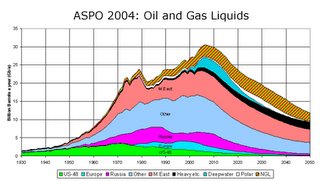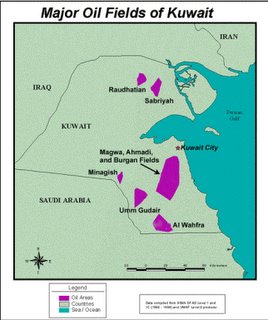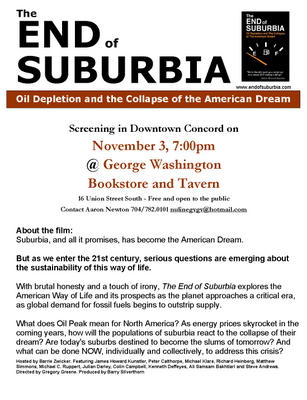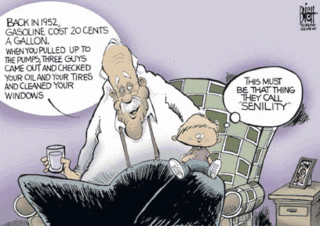
Friday, December 30, 2005
Thursday, December 29, 2005
gas tax increase
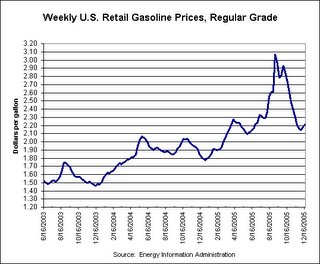
A look at this graph shows a steady increase in gasoline prices since late 2003. There's an obvious spike in price after hurricane Katrina which is followed by a correction and then a return to rising prices. Let's take that 23% increase for 2005 and do some projection for the next three years shall we?
2006 $2.69 per gallon
2007 $3.31 per gallon
2008 $4.07 per gallon
For all you non-math majors out there a 23% annual increase means the price will double every 3 years. Still worried about North Carolina's planned gas tax increase of $0.03 per gallon next year?
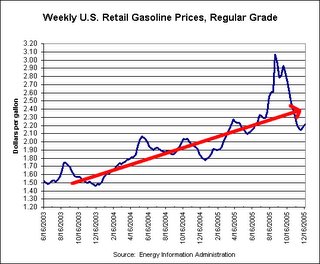
Ladies and gentlemen we have a larger problem.
Wednesday, December 28, 2005
Tuesday, December 27, 2005
what did you get for christmas?

The quantity and quality of the Christmas gifts I received this year illustrate just how blessed my family really is. I’m not sure I could write down all the presents I received without getting up from the computer and making a list out in the living room where this year’s offerings are waiting to be put away. One in particular stands out. I received the gift from a co-worker at our annual Christmas party. She gave me a card and wrote in it to …"remember these two things: think globally and act locally". There were two gifts attached. The first was labeled, Think Globally. It was an announcement that she had purchased baby chicks through Heifer International. For almost 60 years this organization has offered a way for individuals to purchase a source of food for a family in need. My gift was a flock of chickens given to a poor family to raise as a source of eggs and more chickens to sell and share with others in need. The second gift was labeled, Act Locally. It was a gift certificate to Heirloom Seeds. For the past three years I’ve been growing more and more of my own food on our ¼ acre lot. My co-worker knows this and was kind enough to give me the power to continue to provide for myself and my family in this way. I actually only received a card and a few slips of paper. The power of her gift though is profound. I am helping a feed a family in need and my family as well. No trinkets, no knick-knacks, no gadgets, just the power to take care of myself and others by feeding them.
I believe that over the next few years it will become evident that George Monbiot is right when he says we, are the most fortunate generations that have ever lived. Ours are the most fortunate generations that ever will. As our incredible sources of energy embodied in fossil fuels reach a maximum rate of extraction, I think we will have to begin again to do with less. I do not think this reduction will be unwelcome by many. I think many Americans have begun to ask themselves, “How much is enough?” Just how big a house do I really need? 2,000 square feet? 4,000 square feet? 10,000? How much food can I eat? How many showers can I take? How big does my vehicle really need to be? My television? My dinning room table? When will I purchase enough to be happy? And I would argue that many Americans are beginning to understand the words I first learn from a plaque on my Grandmother’s wall. It read, Contentment is not the fulfillment of what you want but the realization of what you already have. It may prove that the greatest gift she ever gave me was an understanding of the great power that I have within me and you have within you. We are all capable of taking care of ourselves and those around us. We do not need more “things” to make us happy, just the utilization of what we already have.
George Monbiot went on to say, And we find ourselves in an extraordinary position. This is the first mass political movement to demand less, not more. The first to take to the streets in pursuit of austerity. The first to demand that our luxuries, even our comforts, are curtailed.”
We cannot call on others to stop flying if we still fly. We cannot ask the government to force us to change if we are not ready to change. The greatest fight of our lives will be fought not just out there, but also in here.
Over the next few months I’m going to discuss in more detail the actions we can all take in order to provide for ourselves what we have until recently relied upon others to provide. I also plan to sprinkle in more links to the writings of others on topics I think important. All this against the backdrop of an understanding that maybe less, not more, means better. Please be apart of the discussion. Feel free to request that I research certain topics concerning personal freedom through rejection of the bonds of materialism and greed or maybe just a better way of gardening. Please forward links you think I might be interested in. Thanks as always for listening.
Check out George Monbiot and his article in its entirety.
Wednesday, December 21, 2005
high gas prices vs. the epa

Who wants to bet on how fast environmental regulations reducing sulfur content and carcinogenic additives in gasoline get tossed out the window on our way over the peak? The following came from an article on MSNBC.
The introduction of lower sulfur requirements for gasoline and diesel combined with a shift in gasoline additives could reduce supplies and create problems for refineries trying to produce fuel to meet the new specifications, according to analyst Trilby Lundberg.
"In 2006, the EPA could well cost gasoline consumers more than Hurricane Katrina did."
"This supply loss is permanent, unlike a storm idling refining capacity, even one as horrendous as Katrina. While some of the supply loss will be made up by ethanol, the rest must come from greater gasoline imports," Lundberg said.
Entire Article Here
Place your bets...
Thursday, December 15, 2005
does government get it?
Earlier this month The U.S. House of Representatives Committee on Energy and Commerce met specifically to discuss Peak Oil. The audio is available by clicking here. Back in March Representative Roscoe Bartlett, a Republican from Maryland, gave the first of several special order speeches to the House of Representative on the topic. I’ve seen video of one of the speeches. It was late in the evening and almost no one was present to here him. Now it seems that the issue is getting more formal attention in Washington. Representative Bartlett was present at the above mentioned committee meeting and gave remarks. Also in attendance was Robert Hirsch. Dr. Hirsch was the project leader for a report commissioned by the U.S. Department of Energy entitled, “Peaking of World Oil Production: Impacts, Mitigation and Risk Management”. Interestingly the report was released with almost no coverage by the media. I find this strange because the report states, “Dealing with world oil production peaking will be extremely complex, involve literally trillions of dollars and require many years of intense effort.” It goes on to say, “… the problem of the peaking of world conventional oil production is unlike any yet faced by modern industrial society.” If you haven’t read it you should. I would like to think all of our representatives have read this very important government commissioned report. And then I get this.
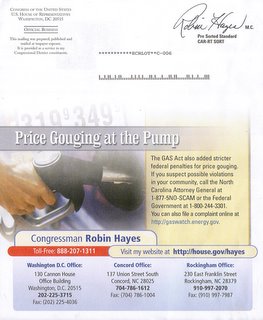
It was recently mailed to my home. Representative Robin Hayes is my local congressman. He was invited by fax to attend my screening of The End of Suburbia earlier this year. It took place 2 blocks from his Concord Office. I must defend his absence as his representation of the 8th Congressional District of North Carolina means he spends quite a bit of time in Washington. I do wish he would have sent someone though. I can not however, defend overly simplistic publications such as this one. After spending quite a bit of time blaming high energy prices on “our narrow refining capacity” he misses the point. Why haven’t oil companies built a new refinery on U.S. soil in almost 30 years he asks? Because they know global oil production will soon peak just like many in the Federal Government have known for years. He goes on to tout his defense of energy assets against aggression by “the Chinese Communist government.” He failed to mention 70% of the products in Wal-Mart stores were made in China and shipped to this country- an operation made possible by cheap fuel prices- an operation that won’t be possible when fuel prices reach a certain point. He also failed to mention that China buys American debt to the tune of almost 1/2 billon dollars a day. I wonder what will happen when China gets unhappy about not begin able to spend its debt dollars in the global free market? But I digress. My Representative went on to briefly mention biofuels, hydrogen cells, and conservation. He did so though in ways that made me unsure as to whether or not he even understands them. “Fuel cells which use hydrogen can power homes and automobiles with virtually no emissions.” He leaves out the fact that Hydrogen fuel cells require energy to split water into hydrogen. They’re batteries that store power not energy sources in and of themselves. The front cover was the most disappointing though. The first thing he wanted the reader to see was a number to call to report possible price gouging violations. It was discouraging to see this sort of pandering to the public’s baseless suspicions. As fuel prices rise many will believe they’re being ripped off by the big bad oil companies. The leaders of our nation are happy to let them believe this as long as it takes the heat off of our representatives. It also avoids tackling the real reason prices are on the rise. I hope Representative Hayes gets a chance to read the Hirsch report and spend a little time with fellow Republican Roscoe Bartlett. I’d like some thoughtful representation in Washington when it comes to Peak Oil and I don’t want to have to move to Maryland to get it.
Tuesday, December 06, 2005
awareness and preparation part II
 So you're terrified of the future described by those who are warning of the coming peak in global oil production and the effects it will have on your life. You can't imagine a rewarding and fulfilling lifetime during which consumption decreases- a lifetime during which in fact all human activity declines. Maybe you've had a sneaking suspicion that despite what Dick Cheney says, our way of life is unsustainable. But you were able to convince yourself we could postpone payment for a bit longer and now you see we can't.
So you're terrified of the future described by those who are warning of the coming peak in global oil production and the effects it will have on your life. You can't imagine a rewarding and fulfilling lifetime during which consumption decreases- a lifetime during which in fact all human activity declines. Maybe you've had a sneaking suspicion that despite what Dick Cheney says, our way of life is unsustainable. But you were able to convince yourself we could postpone payment for a bit longer and now you see we can't.Thousands of Americans are becoming aware of the fact that our way of life is predicated on an energy source that will be entering a permanent phase of production decline in the near future. Some of our older citizens might escape the impact but anyone in their 40's or younger will surely see what it feels like to live with less than their parents did. And if you have children the conversations you carry on in your own head might be even more frightening. No one can tell us exactly what will happen. The future is by definition undefinable. It's not a stretch though to say that Peak Oil will be the single largest event in our lifetimes if not in all of human history.
As people begin to understand our situation as it exists outside of pop media culture coverage, many are having trouble mentally dealing with their epiphanies. It isn't uncommon to see these individuals grappling with the 5 classic stages of grieving. First there's Denial of the problem. We live in an age of affluence, in a country flush with material wealth. The idea that life won't continue as it has to date during our lifetime is tough to admit. Then there's Anger. Once someone has faced the problem and its possible effects he or she tends to get angry. The individual feels cheated or tricked and will blame anyone around: the oil companies, the government, the Middle East, even previous generations of wasteful Americans. Next up is the Bargaining stage. We've lived during an age of incredible technological advancement. Because of this we've developed an unhealthy faith in technology and its ability to continue to make life better. Many believe that because we've been able to do such wonderful things in the past we'll be able to figure something out concerning energy problem in the future. This is a sticking point for most people. Many have yet to get past it. They are willing to switch to a hybrid car or to reinsulated their attic as long as they are still able to drive where they please and walk around at home in their underwear. For those who don't worship technology and are willing to examine its limitation as described by the laws of physics, it becomes painfully clear that there are no comparable substitutes for oil and that change is coming in our lifetimes. Then Depression often sets in. Stable happiness is hard to imagine as any individual completely recreates his or her future based not on the lie of endless growth but on the reality of resource depletion and the limits to growth. For me this lasted about three months. Finally though there is Acceptance. Being constantly sad and upset about something you can't sit down and fix is frustrating. Most people eventually wake up to the fact that life won't stop because you've acquired an understanding of Peak Oil. The world will not come to an end tomorrow. The Peak does not signal the end of the age of mankind. The uncertain future will be full of problems but you now have a way of understanding them. You have the proper perspective with which to comprehend our era. And you have time yet to prepare yourself and your family and your friends and maybe even your community for the coming events. So now what do you do?
I have previously posted about three online resources for personal preparation. I believe this sort of preperation is extremely important. Here are four members of the movement of Peak Oil community planning. Some say you're only as prepared as your neighbor is. I kinda agree.
First up we have Rob Hopkins and Transition Culture. He has produced a road map of sorts and describes it this way. This plan was produced at Kinsale FEC by myself and the college’s second year students, and was, as far as we know, the first attempt by a community to design an intentionally designed way down from the oil peak.
Here in the United States we see the community of Willits, Ca and the WELL organization (Willits Economic LocaLization) Here's a community serious about addressing the issues of Peak Oil through relocalization.
The Community Solution is an organization dedicated to the development, growth and enhancement of small local communities. They have a proposal for a Post-Peak Oil Community called Agraria in Yellow Spring, Ohio. Incidentally Yellow Springs hosted this year's Second Conference of Peak Oil and the Community Solution this past September.
Lastly I wanted to mention the Unplanner formerly of Southern California recently relocated(for reasons you might guess) to Lincoln County, Oregon. I find his articles insightful, especially his idea for beginningng the process of planning for the post-petroleum era.
Never has it been more important to think globally and act locally.

Tuesday, November 22, 2005
thanksgiving day peak
By silly Mr. Deffeyes means that choosing an individual day on which to mark the pinnacle of global oil production is a bit like choosing the day on which you became interested in baseball or the day on which day you decided your favorite colour was red. These specifics were developed over time. They involved a process too complicated to which to assign an anniversary date. They were only fully recognized in retrospect. Peak oil will occur in much the same manner. Even if the peak does technically occur this Thursday, no one will notice. Only time will tell. However, in honor of Mr. Deffeyes’s willingness to commit to a specific prediction I bring you the following peaks to consider over the holiday weekend.
Non-OPEC Peak?
This means were going to have to expect OPEC to make up for oil shortfalls starting about now. Matt Simmons, oil economist and former energy adviser to the Bush II administration has a new book out called Twilight in the Desert. In it he argues that Saudi Arabia has substantially less oil than it would have the world believe. How'd you like to bet that other OPEC countries have been misleading us as well? Then again, I’m not sure our own government would tell us if it knew. Look what happened when Jimmy Carter tried to speak sense. If Non-OPEC has peaked you can exspect continued troubles in the Middle East.
American Oil Companies Peak?
 Source
SourceThe above shows many of the major American oil companies declining in production over the past three quarters. Have you ever wondered why the Oil and Gas companies haven’t built a refinery in 30 years. Why they are contracting in face of ever-increasing demand? Why they are consolidating? Why other oil companies from around the world are trying to acquire oil reserves from wherever possible? Ever get the feeling they know something you’re just finding out?
The World’s Second Largest Oil Field Peaks?
Earlier this month Kuwait reported the Burgan Field is in decline. But wait, didn't we just decide we will badly need Middle Eastern oil to help out with the previously discussed shortfalls?
Light Sweet Crude Peak?
In the arena of oil production light, sweet crude is the low hanging fruit from which most gasoline is refined. If we have peaked you can expect prices at the pump to rise indefinitely.
We have much to be thankful for. Here’s a Thanksgiving Day toast- that we might work together to respond to the global peak in oil production so that we may have many Happy Thanksgivings to celebrate in the future. Enjoi your turkey.
Tuesday, November 15, 2005
is the gas crisis over?
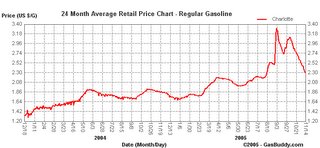
graph from gas buddy
Here in Charlotte gas prices are back down to an average of approximately $2.30 per gallon. That's great but $1 more per gallon than prices at the pump only two years ago at the end of 2003. That's a 77% increase discounting the hurricane price spike. If we continue to follow that track we should expect to see prices above $4 per gallon by the end of the year 2007.
And this is normal?
So how have we been getting low priced gasoline in the wake of the damage done to our oil and gas industry by this year's hurricanes? First there's been the helping hand...
U.S. gasoline imports rose 29 percent to an average 1.2 million barrels a day last week, a Sept. 28 Energy Department report showed. European countries such as France and Germany pledged to release oil and gasoline stocks earlier this month to help alleviate shortages caused by Katrina.
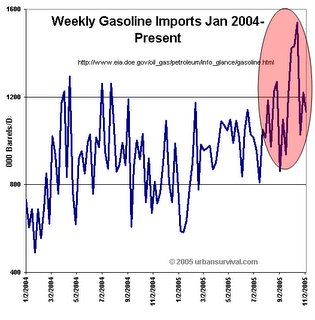
graph from George Ure of urbansurvival.com
The IEA, however, has already voted to stop letting us have world reserves beyond what was voted immediately after Katrina... As the international aid comes to an end I would expect the drop in gasoline prices to as well.
Apparently our own suppliers are also helping out...
Are you hoping for a mild winter? I know quite a few people who are.
The price of gasoline has dropped over the past few weeks. It may even continue to drop over the upcoming holiday season. I would not however add an SUV to your Christmas list. I think you might want to stick with a new winter coat.
Wednesday, November 09, 2005
awareness and preparation
Speaking of which, the Charlotte chapter of The Peak Oil Mitigation League is holding its November meeting this evening, November 9, 2005 at 6:00 pm. It’s to be held at the Robinson Middle School Cafetorium, Ballantyne Commons Pkwy Charlottte, NC 28277 980/343.6944. My apologizes for the last minute notification. I only recently became aware of this group and this meeting. I do not know much about either and would suggest using the above link to gather more information.
Last Thursday, during our discussion after the documentary was over, I made an observation that I hadn’t fully considered until it was on its way out of my mouth. For several years now (some would argue since the 70’s) there’s been a debate about whether or not the world’s oil production will ever peak, whether a day will ever come when we produce less oil as a planet than the day before. As you fast forward through history towards the present you see almost all authorities on oil production begin to agree that the peak is real and it is coming. The discussion shifted from “if” to “when”. Recently though the discussion has shifted again, this time from “when will it happen” to “well… what do we do about it?” Responses vary widely. There are those who still deny the existence of a problem. There are those who are unworried and point to the free market and the technological marvels of the past century as probable saviors of the future. I characterize these groups as ostriches with their heads fully submerged in the sand. There are however many individuals and indeed several communities who have entered into a dialogue concerning possible responses to peak oil and the end of cheap energy. These groups seem to understand that while the free market and technologies may play a role in any response to the problem they will not be enough to “save” us. They advocate personal as well as community-centered responses to the coming disturbances in the American way of life.
The following are a few of those offering resources concerning personal preparation.
First up is Matt Savinar. He runs a website called Life After the Crash. I don’t normally recommend Matt’s site to those who don’t understand peak oil because his introduction into the issue is so blunt that it can produce a traumatic reaction. He’s recently added a Post-Oil Bulletin section to his website though that is excellent. It costs around $7.00 per issue and is worth much more than that. His philosophy is that getting good advice costs money so he’s paying authorities on various subjects to spend quality time on peak oil response issues. I highly recommend this bulletin to anyone concerned with their future or the future of their family.
Path to Freedom is a website that chronicles the efforts of a family in Pasadena, CA to turn there urban home into an urban homestead. They grow much of there own food, produce much of their own electricity and even brew their own bio-diesel fuel; all of this accomplished from a residential lot within a few miles of the rose bowl. This site is an inspiration to those who think they can’t do more for themselves because they live in the city.
Lastly I want to mention Beyond Peak. This website is an excellent resource concerning all the specific information an individual or family might want to know more about when faced with the challenges of a post-petroleum lifestyle. It’s new and I’ve only just begun to take advantage of the all it has to offer.
There is another group of individuals emerging from the awareness of a future without plentiful petroleum. This group is characterized by a lack of hope when confronted with the extraordinary circumstances likely to be presented to us in the future. Some Americans are awakening to the idea of peak oil and are frozen with dread and inactivity during the very period in which their actions might do the most to mitigate its negative effects- the period before the peak. To this group I’d like to share the idea of doing your best to limit the amount of time you grieve over the future you’ve been promised. To be sure the news of peak oil can be depressing, but don’t waste the opportunity to take steps now to secure your future even if it doesn’t turn out to match your previous expectations. The time for action is now.
In a future post I’ll review some of the organizations and municipalities who are beginning to tackle community-centered responses to these issues. In the meantime please prepare yourselves or as my uncle use to say, “If you want to help feed others, first learn to feed yourself.”
Monday, October 24, 2005
Wednesday, October 19, 2005
something's got to give
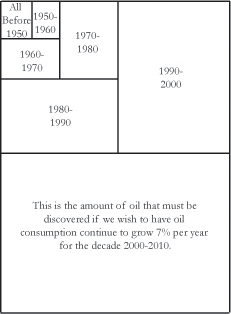
I heard a radio news report this morning again telling the public not to worry, that there is plenty of energy in various forms “at the current rate of consumption”.
“…at the current rate of consumption, the coal reserve will indeed last roughly 250 years.”
- Physics Today Online
“The current estimate of the natural gas resource base in the 48 states…is equivalent to at least 65 to 70 years of supply at the current level of consumption…”
- American Gas Association
“How much uranium is there? The present reserves and resources… are about 3.5 million tones. This is enough to last some fifty years at the current consumption rate.”
-Open Democracy . Net
But something occurred to me. Isn’t our current financial system based on compounding interest? Isn’t the United States economy and by default the world economy based on growth?
“Since 1970, [United States] GDP growth has averaged 3.16 percent per year, after inflation.”
- The Heritage Foundation
“Between 1970 and 1995, a period of slow growth compared with the post-war decades, the Gross World Product grew by 2.9 percent annually” (Figure 1)
- The End of Economic Growth by Charles Siegel
 Graph by: Organisation for Economic Co-operation and Development
Graph by: Organisation for Economic Co-operation and DevelopmentIsn’t our population in this country and on this planet increasing? Won’t these additional persons want to drive and to eat and stay warm in the winter?
“…the total world demand for energy has increased by 32% between 1980 and 1998.
During the same period, the population increased by 33%.”
- Energy Information Administration
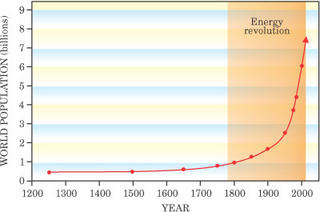 Graph by: Physics Today October 2005
Graph by: Physics Today October 2005
How can we be so blind as to accept predictions of ample energy “at the current rate of consumption” and still expect population growth and economic prosperity to continue?
Something’s got to give.
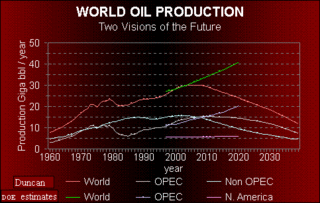 Graph from: The Peak of Oil Production and the Road to the Oldvai By Richard C. Duncan
Graph from: The Peak of Oil Production and the Road to the Oldvai By Richard C. Duncan
For more on exponential growth you’re welcome to read the following excerpt from "Forgotten Fundamentals of the Energy Crisis" by Dr. Albert A. Bartlett.
When a quantity such as the rate r( t ) of consumption of a resource grows a fixed percent per year, the growth is exponential:
r ( t ) = r0 e k t = r0 2 t / T2
where r0 is the current rate of consumption at t = 0, e is the base of natural logarithms, k is the fractional growth per year, and t is the time in years. The growing quantity will increase to twice its initial size in the doubling time T2where: T2 (yr) = (ln 2) / k » 70 / P
and where P, the percent growth per year, is 100k. The total consumption of a resource between the present (t = 0) and a future time T is:
C = {T to 0} r(t) dt
The consumption in a steady period of growth is:
C = r0 {T to 0} e kt dt = ( r0 / k ) ( e kt - 1 )
If the known size of the resource is R tons, then we can determine the exponential expiration time (EET) by finding the time Te at which the total consumption C is equal to R: R = ( r0 / k ) ( e kTe - 1 )
We may solve this for the exponential expiration time Te where:
EET = Te = ( 1 / k ) ln ( k R / r0 + 1 )
This equation is valid for all positive values of k and for those negative values of k for which the argument of the logarithm is positive.
-Albert A. Bartlett, Professor Emeritus of Physics at the University of Colorado in Boulder
Thursday, October 13, 2005
relocalization anyone?
Examination of this inevitable phenomenon reveals benefits for small towns and cities across America. Think about how the death of big box stores like Wal-mart will help local communities. Yes, at first this will displace those who work there. But the needs for goods previously provided by these stores will persist. Local businesses that don’t rely on the shipping of goods over vast distances could regain their footing. The foreign labor formerly responsible for the manufacturing of these goods will be supplanted by this change . What will be needed is labor close to home to get the job done.
Local manufacturing of all types not to mention repair work, food production (especially food production) and other industries could see a resurgence. There will be big bumps along the way. Many businesses reliant upon the current ease with which we move great distances daily will wither and fade away. Whole industries, even local ones might not make the transition. Trucking, for example, is in for a rocky road. I believe the key will be how quickly we recognize the inevitability of relocalization and respond accordingly. Unfortunately there will be those who resist the truth of situation and force hardship upon their communities because of a lack of vision. Pick your local leaders wisely and don’t forget to educate them.
Take advantage of relocalization.
Tuesday, October 11, 2005
hollywood's newest genre
Monday, October 10, 2005
the long emergency
October 5, 2005
Remarks by James Howard Kunstler
Author of The Long Emergency
In the waning months of 2005, our failure to face the problems before us as a society is a wondrous thing to behold. Never before in American history have the public and its leaders shown such a lack of resolve, or even interest, in circumstances that will change forever how we live.
Even the greatest convulsion in our national experience, the Civil War, was preceded by years of talk, if not action. But in 2005 we barely have enough talk about what is happening to add up to a public conversation. We're too busy following Paris Hilton and Michael Jackson, or the NASCAR rankings, or the exploits of Donald Trump. We're immersed in a national personality freak show soap opera, with a side order of sports 24-7.
Our failure to pay attention to what is important is unprecedented, even supernatural.
This is true even at the supposedly highest level. The news section of last Sunday's New York Times did not contain one story about oil or gas - a week after Hurricane Rita destroyed or damaged hundreds of drilling rigs and production platforms in the Gulf of Mexico - which any thought person can see leading directly to a winter of hardship for many Americans who can barely afford to heat their homes - and the information about the damage around the Gulf was still just then coming in.
What is important?
We've entered a permanent world-wide energy crisis. The implications are enormous. It could put us out-of-business as a cohesive society.
We face a crisis in finance, which will be a consequence of the energy predicament as well as a broad and deep lapse in our standards, values, and behavior in financial affairs.
We face a crisis in practical living arrangements as the infrastructure of suburbia becomes hopelessly unaffordable to run. How will fill our gas tanks to make those long commutes? How will we heat the 3500 square foot homes that people are already in? How will we run the yellow school bus fleets? How will we heat the schools?
What will happen to the economy connected with the easy motoring utopia - the building of ever more McHouses, WalMarts, office parks, and Pizza Huts? Over the past thirty days, with gasoline prices ratcheting above $3 a gallon, individuals all over America are deciding not to buy that new house in Partridge Acres, 34 miles from Dallas (or Minneapolis, or Denver, or Boston). Those individual choices will soon add up, and an economy addicted to that activity will be in trouble.
The housing bubble has virtually become our economy. Subtract it from everything else and there's not much left besides haircutting, fried chicken, and open heart surgery.
And, of course, as the housing bubble deflates, the magical mortgage machinery spinning off a fabulous stream of hallucinated credit, to be re-packaged as tradable debt, will also stop flowing into the finance sector.
We face a series of ramifying, self-reinforcing, terrifying breaks from business-as-usual, and we are not prepared. We are not talking about it in the traditional forums - only in the wilderness of the internet.
Mostly we face a crisis of clear thinking which will lead to further crises of authority and legitimacy - of who can be trusted to hold this project of civilization together.
Americans were once a brave and forward-looking people, willing to face the facts, willing to work hard, to acknowledge the common good and contribute to it, willing to make difficult choices. We've become a nation of overfed clowns and crybabies, afraid of the truth, indifferent to the common good, hardly even a common culture, selfish, belligerent, narcissistic whiners seeking every means possible to live outside a reality-based community.
These are the consequences of a value system that puts comfort, convenience, and leisure above all other considerations. These are not enough to hold a civilization together. We've signed off on all other values since the end of World War Two. Our great victory over manifest evil half a century ago was such a triumph that we have effectively - and incrementally - excused ourselves from all other duties, obligations and responsibilities.Which is exactly why we have come to refer to ourselves as consumers. That's what we call ourselves on TV, in the newspapers, in the legislatures. Consumers. What a degrading label for people who used to be citizens.
Consumers have no duties, obligations, or responsibilities to anything besides their own desire to eat more Cheez Doodles and drink more beer. Think about yourself that way for twenty or thirty years and it will affect the collective spirit very negatively. And our behavior. The biggest losers, of course, end up being the generations of human beings who will follow us, because in the course of mutating into consumers, preoccupied with our Cheez Doodle consumption, we gave up on the common good, which means that we gave up on the future, and the people who will dwell in it.
There are a few other impediments to our collective thinking which obstruct a coherent public discussion of the events facing us which I call the Long Emergency. They can be described with precision.
Because the creation of suburbia was the greatest misallocation of resources in the history of the world, it has entailed a powerful psychology of previous investment - meaning, that we have put so much of our collective wealth into a particular infrastructure for daily life, that we can't imagine changing it, or reforming it, or letting go of it. The psychology of previous investment is exactly what makes this way of life non-negotiable.
Another obstacle to clear thinking I refer to as the Las Vegas-i-zation of the American mind. The ethos of gambling is based on a particular idea: the belief that it is possible to get something for nothing. The psychology of unearned riches. This idea has now insidiously crept out of the casinos and spread far-and-wide and lodged itself in every corner of our lives. It's there in the interest-only, no down payment, quarter million-dollar mortgages given to people with no record of ever paying back a loan. It's there in the grade inflation of the ivy league colleges where everybody gets As and Bs regardless of performance. It's in the rap videos of young men flashing 10,000-dollar watches acquired by making up nursery rhymes about gangster life - and in the taboos that prevent us from even talking about that. It's in the suburbanite's sense of entitlement to a supposedly non-negotiable easy motoring existence.
The idea that it's possible to get something for nothing is alive and rampant among those who think we can run the interstate highway system and Walt Disney World on bio-diesel or solar power.
People who believe that it is possible to get something for nothing have trouble living in a reality-based community.
This is even true of the well-intentioned lady in my neighborhood who drives a Ford Expedition with the War Is Not the Answer bumper sticker on it. The truth, for her, is that War IS the Answer. She needs to get down with that. She needs to prepare to send her children to be blown up in Asia.
The Las Vegas-i-zation of the American mind is a pernicious idea in itself, but it is compounded by another mental problem, which I call the Jiminy Cricket syndrome. Jiminy Cricket was Pinocchio's little sidekick in the Walt Disney Cartoon feature. The idea is that when you wish upon a star, your dreams come true. It's a nice sentiment for children, perhaps, but not really suited to adults who have to live in a reality-based community, especially in difficult times.
The idea - that when you wish upon a star, your dreams come true - obviously comes from the immersive environment of advertising and the movies, which is to say, an immersive environment of make-believe, of pretend. Trouble is, the world-wide energy crisis is not make-believe, and we can't pretend our way through it, and those of us who are adults cannot afford to think like children, no matter how comforting it is.
Combine when you wish upon a star, your dreams come true with the belief that it is possible to get something for nothing, and the psychology of previous investment and you get a powerful recipe for mass delusional thinking.As our society comes under increasing stress, we're liable to see increased delusional thinking, as worried people retreat further into make-believe and pretend.
The desperate defense of our supposedly non-negotiable way of life may lead to delusional politics that we have never seen before in this land. An angry and grievance-filled public may turn to political maniacs to preserve their entitlements to the easy motoring utopia - even while reality negotiates things for us.
I maintain that we may see leaders far more dangerous in our future than George W. Bush.The last thing that this group needs is to get sidetracked in paranoid conspiracy politics, such as the idea that Dick Cheney orchestrated the World Trade Center attacks, which I regard as just another form of make-believe.This is what we have to overcome to face the reality-based challenges of our time.
At the bottom of the Peak Oil issue is the fear that we're not going to make it.
The Long Emergency looming before us is going to produce a lot of losers. Economic losers. People who will lose jobs, vocations, incomes, possessions, assets - and never get them back. Social losers. People who will lose position, power, advantage. And just plain losers, people who will lose their health and their lives.
There are no magic remedies for what we face, but there are intelligent responses that we can marshal individually and collectively. We will have to do what circumstances require of us.
We are faced with the necessity to downscale, re-scale, right-size, and reorganize all the fundamental activities of daily life: the way we grow food; the way we conduct everyday commerce and the manufacture of things that we need; the way we school our children; the size, shape, and scale of our towns and cities.
These are huge tasks. How can we bring a reality-based spirit to them?
I have a suggestion. Let's start with one down-to-earth project that we can take on with confidence, something we have a reasonable shot at accomplishing, and fairly quickly, something that will address our energy problems directly and will make a difference for the better. Let's get started rebuilding the passenger railroad system in our country.Nothing else we might do would make such a substantial impact on our outlandish oil consumption.
We have a railroad system that the Bulgarians would be ashamed of.
The fact that we are not talking about this shows how deeply unserious we are - especially the Democratic party. I am a registered Democrat. Where is my party on this issue? Where was John Kerry? Where are Senators Hillary Clinton and Charles Schumer? We should demand that they get serious about rebuilding the public transit of America - not next month or next year but tomorrow, starting at the crack of dawn.
Any person or any group who finds themselves in trouble has to begin somewhere. They have to take a step that will prove to themselves that they are not helpless, that they are capable of accomplishing something, and accomplishing that first thing will build the confidence to move on to the next step.
That's how people save themselves, how they reconnect with reality-based virtue.
We were once such a people. We were brave, resourceful, generous, and earnest. The last thing we believed was the idea that it was possible to get something for nothing. That we were entitled to a particular outcome in life, apart from the choices we made and how we acted. We can recover those forsaken elements of our collective character. We can be guided, as Abraham Lincoln said, by the better angels of our nature.
We lived in a beautiful country with vibrant towns and cities, and a gorgeous, productive rural landscape, and we were sufficiently rewarded by them so we did feel driven to seek refuge in make-believe all the livelong day. When we wanted to accomplish something we set out to do it, to make it happen, not merely to wish for it. We knew the difference between wishing and doing - which is probably the most important thing that adult human beings can know.
I hope we can get back to being that kind of people. This effort here today is a good start.
END
Wednesday, October 05, 2005
gas is going up(side down)
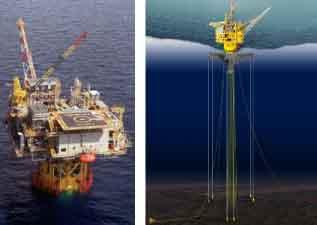

There will also be a lot of talk about how this problem is short-term. I liken the situation to driving around on bald tires. We just had a blow out. Will we buy a new set or just patch up the hole and get back on the road? Tires, by the way, are made of oil.
Lately people have also been asking me about price gouging by oil and gas producers and distributors. Insert interesting argument about the revered law of supply and demand here. Greedy convenience store owners aside, I don't think the bigger boys are interested in taking short term profits above normal margins. In fact I think oil and gas companies will be willing to take it on the chin to a certain extent in order to stave off that sort of criticism. I think though that they do see hurricane-related shortages as a way to raise the public's threshold for higher gas prices. In the past if Exxon or Shell or any of the other oil companies increased prices they would have taken quite a bit of heat. Just look at the protests going on in Indonesia. Now they can point the finger at natural disasters. They understand that the adult American pubic currently has the attention span of a 4 year old and will get used to higher gas prices fairly quickly as long as news of Demi Moore’s latest wedding keeps pouring in. Think, we are no longer talking about when gas will drop back below $2/gallon. We’re checking websites to see who has it for less than $3.
But let’s stop for a moment and examine the effect of a price hike of $1 a gallon for gasoline on someone like me. I drive approximately 350 miles per week. My 1993 Nissan Sentra gets approximately 35 miles/gallon (wanna trade Excursion boy?). That means I use approximately 10 gallons of gas per week. At $2/gallon I spend $20 per week on fuel. Increase the price by $1 a gallon and I’m spending $30 per week. That’s an increase of only $10 per week. That just means I can’t go to Starbucks every morning. It doesn’t mean I’m canceling Christmas. Even if you look at those people who drive cars 1/3 as efficient as mine, say 12 miles per gallon. They would still only be paying $30 additional dollars per week to drive. That ain’t the end off the world either. It’s just sticker shock. But back to Christmas…
More important than the price of gasoline during the last week of september 2005, I would tell you to keep an eye on 2 coming events: the natural gas shortage (and subsequent price increases as we head into winter) AND the holiday spending numbers. Natural gas shortages (the Unites States’ recovery of the stuff was in decline before the storm by the way) will cost people either alot of money or their lives this winter. This will curb spending which will sucker punch the economy as well as scare the poo out of everyone. It’s one thing to cancel your Christmas shopping plans because of sticker shock, it's quite another not to be able to keep your children from freezing to death. Also a drop in consumer confidence (already happening) coupled with a rise in the price of everything made of oil or transported by oil (in other words everything) will cause people to be able to afford considerably less than this time last year. I’m not hoping for it but I think a recession beginning this winter is a pretty safe bet. I’ll go out on a limb- the Dow closes under 8,000 by New Year’s Day 2006.
With that happy prediction out of the way my advice: Do some serious thinking about where your heat comes from. Do the same concerning your local electrical service. Ask family and friends to do some similar thinking. Walk through your safety preparedness- food, water, solar-powered battery chargers, etc. Consider taking some cash out of the market or even out of the bank for emergencies sake. Perhaps purchase some gold or other precious metals as investments during down times. It’s important not to have to think about these things in the dark. Planning for them won't make them happen but it will mean you're better prepared if they do.
Friday, September 30, 2005
Thursday, September 29, 2005
alternative fuels
All in all I found the information interesting. Nothing presented convinced me that other sources of energy will be able to make up for the depleting petroleum supplies in terms of the amount of oil needed to fuel our current transportation habits. Most of the technologies seem like great ideas on a small scale but no single source or combinations of energies seem poised to take over our current circumstance. My take on the day was that it is important to understand the new fuels becoming available and to use them to transition to lifestyles of lower energy use. Do not however, let them blind you to the extraordinary changes set to take place in the amount of energy we consume and the way in which we consume it.
Monday, September 26, 2005
problem in a nut shell

"We're willing to use the Strategic Petroleum Reserve to mitigate any shortfalls that affect our consumers," said George W. Bush on the Monday after Hurricane Rita struck.
Within this statement lies the problem. The powers that rule this nation both corporate and governmental (if there is even a difference anymore) think of the American people first and foremost as consumers. I for one still think of myself more importantly as a citizen. Our government will be totally ineffectual in helping its citizens adjust to the coming conditions brought on by the decrease in available petroleum because they don't see us as citizens. To them we are merely customers.
Tuesday, September 20, 2005
not waiting around
I spent this past weekend on the road. I drove to Philadelphia, PA to pick up my new form of transportation, a 1988 BMW K100 motorcycle purchased online. I couldn’t help but realize that the money saved by shopping at the national flea market that is eBay will soon disappear as shipping costs increase along with fuel prices. I was happy though to stretch my legs and see some of the country and anxious to secure my new vehicle. I have relied on a motorcycle as a means of transportation before, but that was in college where the ability to park next to the front door when running late for class was more important than the increase in fuel efficiency. This time the purchase was planned in order to decrease my personal dependence on big oil companies and overseas supplies. On my drive northward I couldn’t help but think that I see more and more alternatives to the standard 4-wheeled automobile cruising the roads these days.
I thought about my good friend Jared Paulsen. As a wedding present this past May, he received an electric scooter his wife had been excited about for some time. At first, the scooter was relegated to play toy. But being from Nebraska, Jared quickly began tinkering and added enough additional battery power to make round trips to his place of employment. The flat topography of his new costal hometown, Mt Pleasant, SC and his close proximity to work, grocery stores and pubs made his new form of transportation quite practical. Jared and his brother Mat run a kayak touring company called Barefoot Island Sports. They have now added an additional component to their business and have become the local representatives of a website that sells similar forms of 2-wheeled transportation. To date they’ve sold 5 scooters using only word-of-mouth advertising.

I find another example in my good friend Keith Cummings. Keith is a medical student at Duke University and an interesting mix of intelligence, stubbornness and spirituality who will make an excellent doctor if not a wonderful shaman someday. Recent discussions concerning resource depletion show Keith strongly aligned with the technophile group who think human ingenuity spurred to action by the invisible hand of the market will step in with a sword to save us from the beast of supply exhaustion at the very last moment. He is however a very smart guy and I was not surprised to learn that he too has recently acquired an alternative form of transportation of the 2-wheeled variety. He describes his new bike thus:
Displacement - 49cc
Vmax - 42mph (43 downhill)
Efficiency - 87 mpg
Fun Level - 6.5
Off the line - 3-toed-sloth-esque.
Chickmagnitude - 3.1
I couldn’t help but think that the trend is here, that those with the vision to understand the greater context of fuel resources and our coming energy crisis have already begun to react. They are investing in unconventional transportation as the convention itself is distorted by decreasing fuel supplies. Perhaps “The Long Emergency” is already here and we have begun to take steps to transition into a world where energy is not cheap and plentiful. Or maybe bikes are just more fun.
Friday, September 16, 2005
Thursday, September 15, 2005
swimming in oil
fertilizers, pesticides, herbicides, detergents, candles, shower doors, vcr’s, cassette tapes, paints, flooring, carpet, vinyl wall paper, electric blankets, computers, shampoo, fan belts, bowls, cups, plates, roofing, trash bags, toilet seat curtains, toothbrushes, computers, shampoo, fan belts, bowls, cups, plates, roofing material, trash bags, toilet seats, curtains, cell phones and telephones, glue, furniture, toys, computers, tires, records, paraffin wax, film, packaging materials, surfboards, soccer balls, football helmets, skis, basketballs, uniforms, sunglasses, sleeping bags, tents, polyethylene canoes, brake fluid, car batteries, jet fuel, insect repellent, garden hoses, awnings, artificial turf, clotheslines, asphalt, anti-freeze, wire coating, car bodies, oil filters, deodorant, eye glasses, sweaters, crayons, combs, heating oil, pillows, lipstick, nail polish, hair spray, Tupperware, life jackets, beach umbrellas, golf balls, legos, dice, frizbees, fishing rods, roller skates, clothing ink, heat valves, parachutes, antiseptics, pantyhose, rubbing alcohol, shoes, ice trays, rope, balloons, luggage, guitar strings, pens, preservatives, perfumes, and anything made of plastic including an enormous amount of medical equipment.
Don’t forget that many of these items are produced using energy provided by oil and natural gas and shipped to your local Wal-Mart from thousands of miles away using oil to power the boats and the trucks. Your everyday life is incredibly dependent on petroleum.
List provided by the Artic National Wildlife Refuge
Monday, September 12, 2005
so who can i count on?
But what about Southern hospitality and the small, rural towns of close knit neighbors and dependable friendships? Perhaps I too have submitted to the oversimplified idea that anyone south of the Mason-Dixon Line is more likely to shoot you than to feed you. “Where you goin’ city boy?” This is an idea for all of us with ties to this region to ponder as the global peak of oil production begins to make itself known to the greater population. More importantly though I am interested in an idea I trust is not foreign to the South or to any part of the world inhabited by those people who believe in each other- that believe in the power of caring and giving and sharing as not only their duty, but as a way towards a better tomorrow. I believe that innate in all of us is an understanding that no man is an island. We all need friends and loved ones on whom to depend and with whom to share the good and the bad. The idea that we can do it alone is juvenile bravado, fostered currently not only by history but by a culture increasingly supportive of and fascinated by entertainment based on overly simplistic ideas of macho emotional highs. Rambo can kick everyone’s ass and you can too. Rambo doesn't go home at night and rest on the couch. He does not stop at a friend's house on Friday for a beer. He does not need to borrow his neighbor’s wheelbarrow. He is his own man; capable of everything he needs to be. What a dangerous idea. If this thought pattern once found its home more often in the South than in the rest of the country, I’d venture to say it has since spread.
Over zealous individuals ready to use violence to enforce their ideological convictions on others have also historically found home in the southeastern portion of America. And not just those of religious differences but also the idea of racial and other physical differences defining the worth of a human being. Southerners have struggled to come to grips with the horrible history of slavery in their region. Sadly though I must venture to state that these morally base tendencies of human nature are found in people throughout our nation and the world. They regularly manifest themselves in areas outside of the Southern U.S. It is with hope though that I can report that with each new generation I see growing understanding among those of us here in the South that this world is made up of all sorts of people and that prejudgment based on colour or creed or any other difference is useless and debilitating. In short, I know plenty of open-minded young Southerners and plenty of Bigots from elsewhere.
So what are some of the strengths the South has to offer in light of a future in which energy consumption and all the trappings it provides will be dramatically reduced?
The weather is a definite advantage of this area. Perception fluctuates widely but as a whole the South gets ample rainfall. Here in NC we average 40 to 55 inches annually with rain occurring regularly- 95 to 105 days a year. Temperatures are also fairly mild. Our mean daily average temperature is 60 degrees which is one reason why, I suspect, there are so many moving here from the Northeast. Having spent more than 25 winters here I will tell you that it can get cold but seldom do we spend more than a few days with daytime temperatures in the 20’s. Our warmer temperatures do make for some hot summers, but going without air conditioning is much easier to do on a 95 degree day than going without heat on a 5 degree night. To be sure you need a heater to live here, but I fear for those who require large amounts of fuel in the north when heating oil and natural gas become less available. Sunlight is another plus. We average 214 sunny days a year. I think it is also appropriate to look at the three regional conditions discussed above when considering food production. Our warmer temperatures allow us a longer growing season. I’ve read about four seasons gardening in greenhouses in Maine but it’s a whole lot easier to provide for large numbers of people if you don’t have to worry about frost from April until November. And try growing cotton indoors.
This region has other resources. Even in a city the size of Charlotte (1 million or so) you can still find agriculturally viable land within several miles of the city. We have reasonably sized forested tracts for wood and all the red clay for building you could ask for. In addition, there are plenty of small, rural communities, many of whom were established before the automobile was invited. This means that at their core they can do without the large amounts of fuel required to inhabit sprawling suburbs. They can also provide appropriate templates for similar development patterns to begin again.
I believe that in the real world humans need each other. Competition sharpens the axe but cooperation provides the occasion for humans to thrive in every sense of the word. Never could we be more in need of a cooperative, communal spirit than when our species is most challenged. As the most prolific energy source ever discovered begins to show up in smaller amounts it will be community and our willingness to rely on others and allow others to rely on us that will either foster in a new era of understanding among us or, lacking this grace, divide us like never before. I truly hope balance prevails here in the Southeastern United States as well as throughout the rest of the world. Can we here in the South come together and set aside historic differences of opinion for the sake of the greater good? Or are we doomed to fight it out and renew our subscription to idea that the individual above all is more important than the group.
I can not do it alone. I will need your help.
Thursday, September 08, 2005
we must plan for ourselves
[The article is no longer available at that link. You can read the story here.]
I am not interested at this moment in laying blame or shame on any specific doorstep. The point of my post is to draw attention to the lack of response to the disaster or maybe more appropriately stated, the chaotic nature of the limited governmental response to hurricane Katrina. The lesson I take personally from the catastrophe is not to count on being saved by the authorities of this nation.
Years of stable living for those of us lucky enough to be able to provide for ourselves and years of government subsidies for those of us who can not have produced a sense of complacency and entitlement. To believe that anyone owes us anything is to misunderstand the idea of generosity.
I believe in the spirit of giving and I believe this superb attribute to be one of the characteristics that define humanity and civil society. But it is not a certainty that our government will provide us with anything and should not be mistaken for one. Anyone who expects the government to care for him or her in times of crisis and chaos is placing false hope in our inept leaders. The responsibility for the well-being and safety of yourself and your family and your neighbors lies squarely on your shoulders. Are you prepared to take care of yourself and those around you?
I think it is helpful to consider the basic necessities of human life when evaluating your preparedness and the preparedness of those in your community. I find it useful to think in terms of what would be the most important resources to have, and to consider how long you could go without each. In other words a Nintendo Play Station is not necessary and you could go your whole life without it but without water you last only a few days. The short list goes something like this:
Air
Water
Food
Housing
Clothing
Energy
Communication
Transportation
Medical Care
To be sure the above are interconnected. If you have transportation, you can probably obtain food. And in some cases, like the middle of winter in Maine, a heat source might be more important even than water in the short term. Having said that, I hope that as individuals, as families, and as communities we can use the crisis of Katrina to examine how we would go about filing these needs in times of trouble.
Ask yourself, do you have enough food in your pantry for a week? How about 3 months? From how far away does most of your food supply come? Where does your water come from? Do you know anything about rainwater collection and simple methods for purifying it? What sort of tools do you have and how handy are you with them? Could you heat or cool your home without electricity or natural gas? How about cooking with out it? Could you communicate to your family and others without your cell phone? Could you get out of the way of danger if the gas stations run out?
I am not suggesting amnesty for those governmental organizations entrusted by our society with the response to such storms. Nor I am not suggesting a panicked attempt to learn all the survival skills necessary to walk into the woods with only a backpack. You will drive yourself crazy with such a mindset. Further, I think a survivalist mentality runs contray to produtive local reactions to crisis developed through strong local connections. I do hope though that the above are all questions that Americans are asking themselves as they watch those stranded and displaced by Katrina amidst a government response that has lacked luster to put it mildly. I for one will not be sitting at home with my fingers crossed.
Tuesday, September 06, 2005
katrina: will we simply react?
In our current culture, information and entertainment are available in unprecedented formats. Cell phones make most individuals available at any hour in any location. The internet makes products and services accessible at the click of a button. You can even pause live television to ensure your bathroom break doesn’t mean you miss the winning touchdown. One downside of this availability though is an evloving dependency on this on-demand technology. Another drawback is the shortening of American attention spans. Now more than ever we ask, “What have you done for me lately”. The difference is though that now we mean last minute not last week. We have become accustom to filling our heads with sound bites, failing on a regular basis to digest and examine in depth the interconnectedness of our society and its strengths and weaknesses.
Why did a single hurricane cause such a problem in the energy infrastructure of America? Our country uses 21 million barrels of oil a day. The storm reduced the amount available by 1.5 MBD. That’s only a 7% reduction. The result however was an overnight rise in gasoline prices of more than 40% in some markets. There are also refineries responsible for transforming the oil into gas which have been knocked off line. But I none the less was shocked to here reports from friends who witnessed fist fights and rammed cars at gas stations in Charlotte, NC. What would happen if the bread trucks had been unable to fill up and deliver?
On March 16, 2005, OPEC announced that it could no longer handle the indefinite increase in world demand for oil. The announcement was largely unreported by the sound biters and refuted by Saudi Arabia some time later. I’m sure a stern phone call or two from various parties prompted the about face. The second announcement was that, "The world is more likely to run out of uses for oil than Saudi Arabia is going to run out of oil". In other words, it was fantasy.
Then United States was, for quite a while, the leading producer of oil in the world. Oil production in this country peaked in 1970. Since that year our production of oil has decreased each year. There was a brief up tick in production when we tapped Alaska, but we quickly returned to a downward trend in production. Isn’t naïve to think that other nations will not also peak in production? Should we expect these countries to be truthful about the when their peaks will arrive? Because of our constantly declining source of domestic oil, we import more each year. Currently we get roughly 60% of our oil from abroad. As was evident this past week at gas stations in the Southeast, when the supply of energy is limited what’s left will be fought for. Globally perhaps we are already positioning ourselves for a larger battle. I just wonder if the violence and hardship can be blamed solely on the shortages of oil. Or whether we must blame ourselves for not taking the time to examine the events of the present and understand their root cause and respond in appropriate ways.
Katrina was a monumental tragedy as well as a prophetic event. Will it generate only reactionary attention? Will we quickly turn our attetion to the next issue provided for us on our blackberries? Or will it spawn truly responsive action as well to the coming crisis?
Thursday, September 01, 2005
the end of the beginning
I have postponed this first posting as I haven't known exactly where to start. I've decided not to let that fact deter me any longer.
When I was ten years old I first asked myself a question who's answer now seems so obvious. The answer however came with its own set of dreadful recognitions. The question arose from a reading of the book "Watership Down". To put it simply, I began to wonder why humans had so dramatically increased their numbers and their influence over this planet in such a short time. Humans had been kicking around this ball of rock for 10,000 years and just suddenly, in one century jumped from a little over 1 billion in population to just a tad over 6 billion? Surely pure numbers alone can not explain this explosion?
At first of course the question was crudely formed in my young mind but it stuck with me and refined itself over time. I continued to read and studied land planning at University. With this education came an explanation of past civilizations and their organizations. Lacking was any focus on the ones that had collapsed or more specifically why they had collapsed. We are all familiar with the fall of Rome. But I never studied the Norse, the Anastasias, the people of Easter Island or the others. The focus was always on past progress and how our civilization in its current form had come to be. For sure the arithmetic of steady growth played a part, described quite eloquently by Dr. Albert Bartlett, but I began to piece together other bits of information that pointed to the massive role that petroleum played in the rise of this our civilization. Never before had man been able to harness such an incredibly energy source like the one first drilled for by Mr. Edwin L. Drake in Pennsylvania in 1859.
With this new energy source available the number of farmers in the United States of America decreased. In 1890 the census showed a little more than 40% of the population was farming for a living. That number had dropped to less than 2% by 1990 and don’t forget the increase in population to feed. Tractors and pumps power by oil and fertilizers and pesticides created from oil meant fewer humans were needed to produce the food. That left quite a few individuals to think up things like internal combustion engines and such. This is but a single example among many of the pieces of information that began to answer the question that had so long vexed me.
Oil is the cheap, easily recoverable, highly transportable, energy-dense fuel on which the current boom of human population and this age of technology are based. But with my epiphany came a horrible realization. This finite resource is about to reach the peak of its production. This means that for the first time since its discovery, there will be less oil available than oil demanded- for physical reasons, not political ones. Our society will follow oil production in a downward trend and slowly implode or even possibly burst and suddenly crash. In less than 100 years we will live again (with some exceptions) as we did in 1901. Fasten your seatbelts; the ride will be very bumpy.
This will be my place to come and vent my thoughts and feelings, ideas and anxieties concerning this historic shift in the direction of the path of human beings of this our planet Earth and the aforementioned bumps. Feel free to join in.

Graph: The Energy Curve of History?
Source: Community Solution
